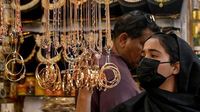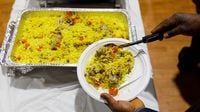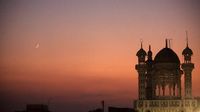As the holy month of Ramadan draws to a close, Muslims around the world are preparing for one of the most significant celebrations in the Islamic calendar—Eid al-Fitr. This year, the festival is expected to be observed on either March 30 or March 31, depending on the sighting of the crescent moon. The anticipation is palpable, with families and communities gearing up for a joyous occasion marked by prayer, feasting, and acts of charity.
Eid al-Fitr, which translates to "Festival of Breaking the Fast," signifies the end of Ramadan, a month dedicated to fasting, prayer, and reflection. Ramadan 2025 began on February 28 in many regions, including the United States, and has been a period of spiritual growth and community bonding. This year, as Ramadan concludes, the excitement for Eid is evident, with preparations underway across the globe.
In Cairo, Egypt, for instance, the streets are filled with the aroma of traditional cookies being baked in anticipation of the celebration. On March 27, 2025, families were seen making these delightful treats, a staple during Eid festivities. The cookies, often adorned with intricate designs, symbolize the joy of the occasion and the spirit of sharing with loved ones and neighbors. According to Xinhua, the preparations are in full swing, showcasing the rich cultural traditions associated with Eid al-Fitr.
In the UK, Muslim communities are also gearing up for the festivities, which could involve gathering in parks and squares for prayer and celebration. The first moon sighting to determine the exact date of Eid is crucial, as many look to Saudi Arabia for guidance. The moon sighting is a practice rooted in tradition, where the sighting of the crescent moon marks the transition from Ramadan to Shawwal, the tenth month of the Islamic calendar.
As the festival approaches, the significance of Eid al-Fitr becomes even more pronounced. It is a time for forgiveness, reflection, and gratitude. Families come together to share meals, often featuring traditional dishes that vary by region. In many cultures, it is customary for children to receive gifts, known as Eidi, from their elders, which adds to the festive atmosphere. The essence of Eid is encapsulated in the common greeting, "Eid Mubarak," meaning "have a blessed Eid," which is exchanged among friends and family.
In preparation for the festivities, Muslims are encouraged to perform acts of charity, known as Zakat al-Fitr, which is given to those in need before the Eid prayers. This act of giving reinforces the community spirit and ensures that everyone can partake in the joy of the holiday. Sherif Elfass, a member of the Northern Nevada Muslim Community, emphasized the importance of charity during this time, stating, "Whatever you do in that month [Ramadan], it is multiplied." This sense of solidarity is a core value during Eid, as families strive to ensure that the less fortunate can also celebrate.
The celebratory nature of Eid extends beyond just the day itself. While the festival is officially a one-day event, many communities celebrate for up to three days, filled with prayers, feasts, and social gatherings. In cities like Dubai and Kuala Lumpur, landmarks are illuminated to mark the occasion, creating a vibrant atmosphere of joy and unity.
As families prepare for the festivities, the excitement grows. In preparation for Eid, many people purchase new clothes, often traditional attire, to wear during the celebrations. This practice not only symbolizes renewal but also reflects the importance of presenting oneself well on this special day. The anticipation of receiving gifts and the joy of sharing meals with family and friends add to the festive spirit.
In the United States, communities are also planning celebrations that reflect their diverse cultural backgrounds. For instance, the Northern Nevada Muslim Community is hosting an Eid celebration on March 30, 2025, featuring food trucks serving a variety of cuisines, including halal American and Mexican dishes. Such events foster a sense of community and inclusivity, inviting everyone to join in the festivities.
As Eid al-Fitr approaches, it serves as a reminder of the values of compassion, empathy, and community that are central to the Muslim faith. The festival not only marks the end of a month-long period of fasting but also encourages individuals to reflect on their spiritual journeys and the importance of giving back to those in need. The joy of Eid is not just in the festivities but in the shared experiences and the bonds that strengthen communities.
As Muslims around the world prepare to celebrate Eid al-Fitr, the anticipation is palpable. With the moon sighting determining the exact date, families are ready to embrace the joy, gratitude, and community spirit that this festival embodies. Whether in Cairo, the UK, or the United States, the significance of Eid al-Fitr resonates deeply, reminding everyone of the blessings of togetherness and the importance of compassion.
In essence, Eid al-Fitr is more than just a holiday; it is a celebration of faith, family, and community. As Muslims gather to mark this special occasion, they do so with hearts full of gratitude and a commitment to fostering peace and goodwill in their communities.







